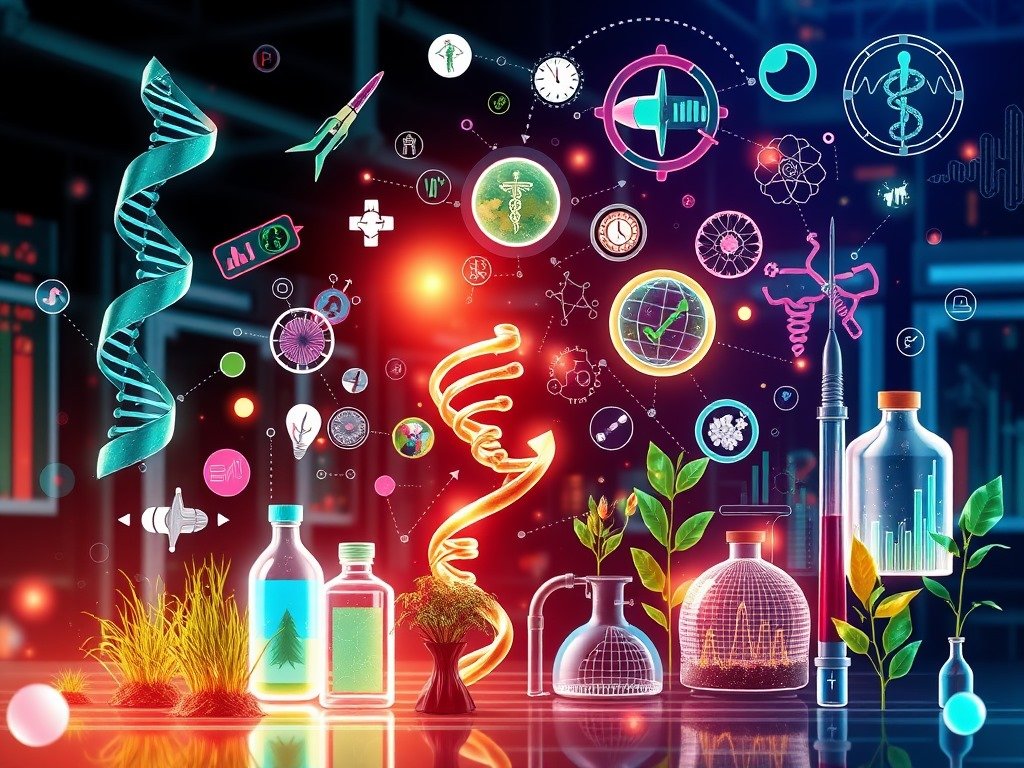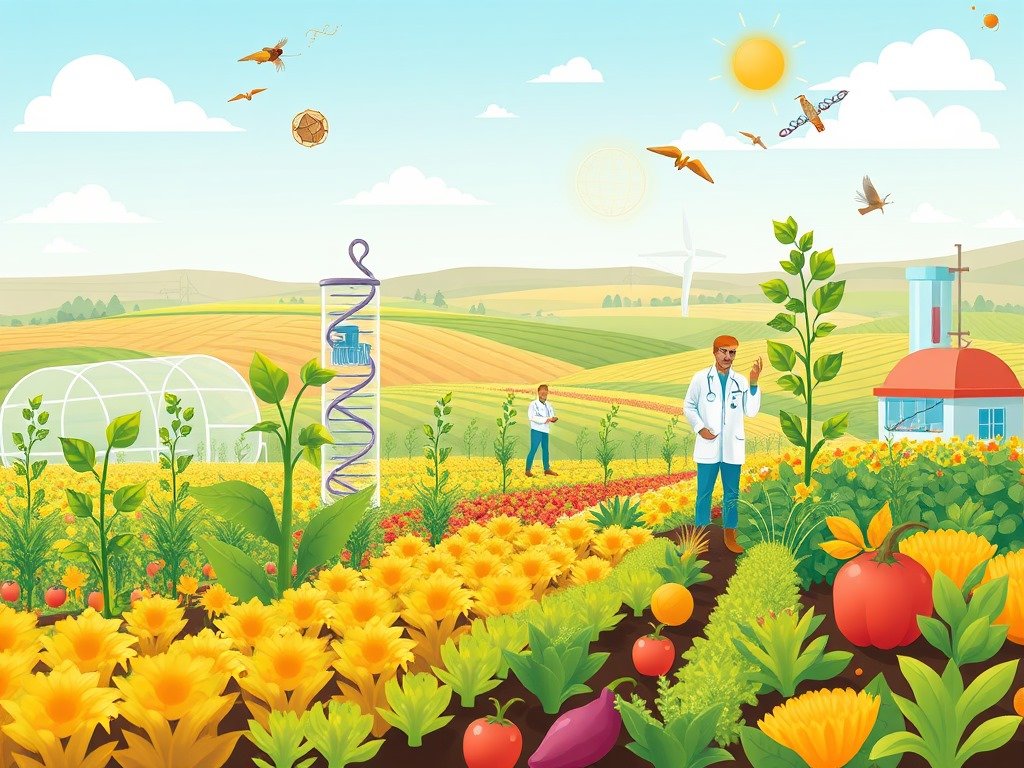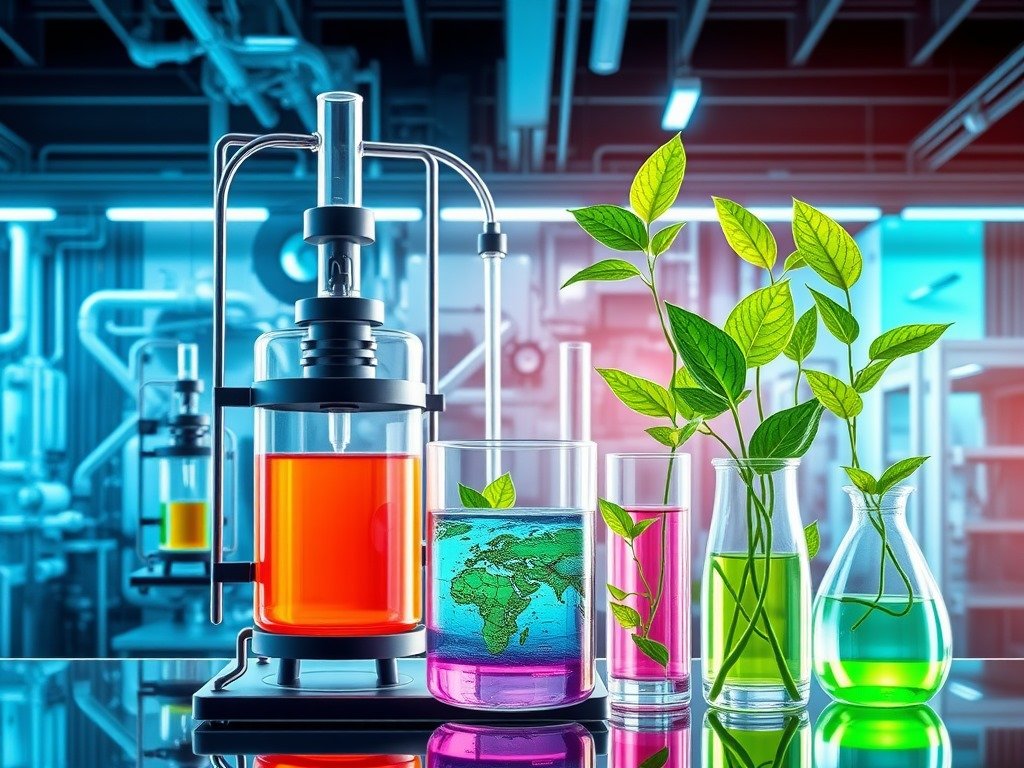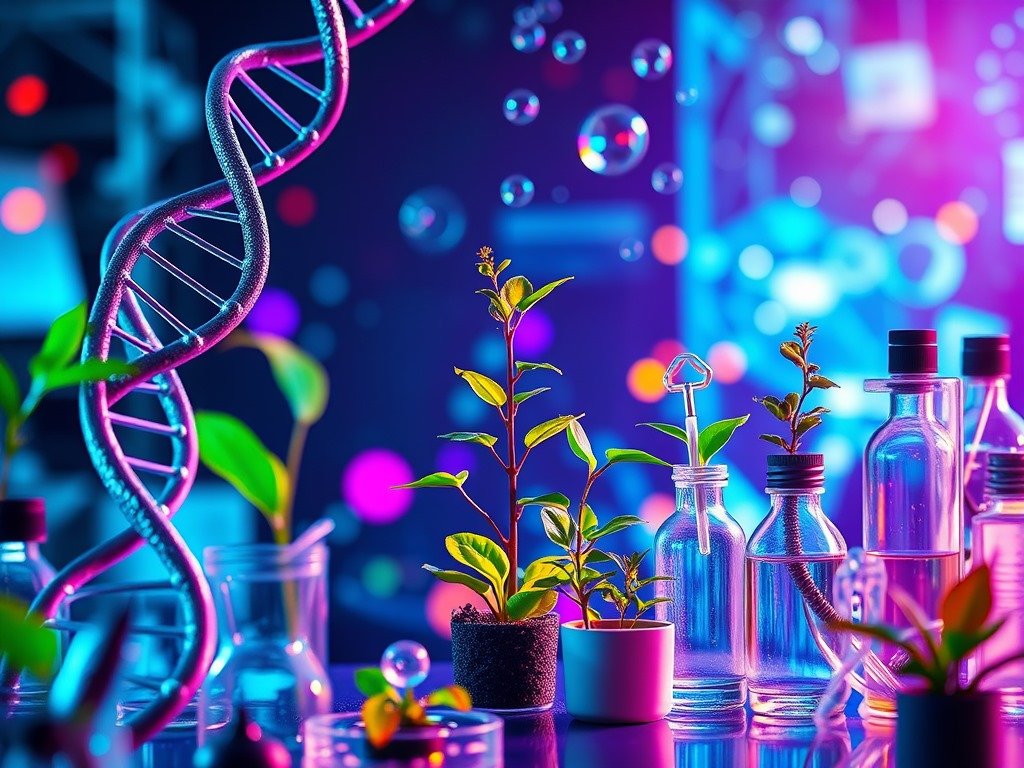Biotechnology is a relatively new field that combines biology and technology to create products and processes that improve our lives every day. It is a main driver of numerous industries, such as medicine, agriculture, and the environment. Through the utilization of living organisms, cells, and biological systems, biotechnology aims to create new solutions for some of the world’s toughest problems. This vibrant science is not only revolutionary but also crucial to spur economic development and propel societal advancement.
As we continue to harness the potential in biotechnology, its impact becomes increasingly evident. The potential to revolutionize medicine by biopharmaceuticals, improve food security by agricultural biotechnology, and address environmental issues by sustainable technologies speaks volumes about the expanse of this science. Most importantly, biotechnology is an enabler that is making not just scientific progress but also social progress, with heartening trends toward a healthier, more sustainable world for all.

Historical Context
Biotechnology’s origins are to be found way back in the distant past, thousands of years ago when man first employed fermentation to produce bread and drinks. These and other early uses were the beginning of the ways that living organisms might be employed to produce food and drink, and this formed the basis of biotechnological procedures. It wasn’t until the 20th century that biotechnology began to develop into what we know it as today. The identification of the structure of DNA by James Watson and Francis Crick in 1953 was the landmark event which changed the course of biological sciences. The discovery opened up frontiers in molecular biology and genetic engineering since scientists could now investigate deeper into the genetic make-up of organisms.
After the discovery of genes, biotechnology evolved further with the development of genetically engineered technologies such as recombinant DNA technology. Scientists were now able to manipulate genes with accuracy, producing genetically modified organisms (GMOs) that are tremendously promising in many fields of agriculture, medicine, and environmental management. Such a breakthrough in biotechnology not only improved productivity and efficiency but also opened up new solutions to global problems, such as food security and the treatment of diseases. As the science continues to develop, its past history provides a vision of the tremendous ways biotechnology has and will change our world.
Applications in Medicine
There’s no doubt that the field of biotechnology penetrated in every area, including medicine. Biopharmaceuticals-from living sources-have got a revolution in treating diseases like cancer, diabetes, and other conditions. Use of monoclonal antibody production and gene therapy has started to widen the horizons of conventional medicine that can provide targeted therapy with minimal side effects. Furthermore, personalized medicine allows for such medical interventions that take into consideration individual genetic differences, resulting in improved effectiveness and outcomes. As biotechnology continues to develop, it holds promise for further revolutionary medical discoveries.
The encyclopedia of agriculture advances food security and sustainability. Genetic engineering can introduce resistant varieties of crops to insects, diseases, or any such environmental extremes as drought. These technologies not only enhance productivity but also save on chemical pesticide inputs, thereby promoting sustainable agriculture. Another important use is that biotechnology enables the production of biofortified crops loaded with essential nutrients in order to fight the challenge of malnutrition in underprivileged populations. Agricultural biotechnology will, therefore, be a prime actor in meeting food demand as the world population continues to grow.

2.Environmental Biotechnology
The ability of biotechnology to combine natural processes with environmental demands begs to suggest its truly interventionist nature. Thus, ecological biotechnology manipulates the use of microorganisms in processes such as bioremediation to render relatively harmless contaminated water and soil. Some bacteria and fungi can degrade toxic pollutants, thus helping ecosystems that were damaged by factory wastes or agricultural runoff. Not only does this method decrease the immediate impact of pollution, but it also promotes the long-term health of the ecosystems so that plant life and wildlife can once again thrive. That the processes of nature itself can be harnessed to purify the environment speaks to the power of biotechnology in being capable of enabling sustainable solutions.
Apart from bioremediation, environmental biotechnology also has a significant role to play in waste management and biodegradable product development. Through the production of alternatives to conventional plastics and other non-biodegradable substances, biotechnology reduces landfill content and pollution from conventional materials. Second, bioenergy innovation such as the conversion of organic waste into renewable energy sources provides an environment-friendly alternative for energy generation with lesser environmental impact. In all, environmental biotechnology offers a range of organism-based solutions that are cost-effective and sustainable alternatives to traditional environmental management systems and are crucial in the abatement of climate change and environmental degradation.
Industrial biotechnology is a revolutionary process that uses enzymes, microbes, and cell cultures to produce bio-based products and processes. Industrial biotechnology is a very important new science that is responsible for the production of environmentally friendly alternatives to fossil fuels, which reduce carbon dioxide emission and wastage exponentially.
For example, biomass biofuels from organic wastes are recyclable energy capable of reversing climate change by providing alternative cleaner fuels. By using microorganisms to convert waste into energy, industrial biotechnology not only reduces reliance on non-renewable resources but also addresses the serious issue of waste management.
Together with biofuels, industrial biotechnology is an important avenue towards creating a circular economy for biodegradable plastics and plastic alternatives. The development of biodegradable alternatives has dramatically reduced the environmental footprints of conventional plastics, which we often consider as persisting as pollution, using enzymes to hydrolyze large polymers. Microorganisms are also applied to ferment and other industrial processes to produce valuable chemicals and materials in a sustainable manner. Not only do these methods improve the utilization of resources, but they also promote economic growth through the creation of new markets for bio-based products. In general, industrial biotechnology plays a main role in facilitating the way for an environmentally oriented, more sustainable future, introducing pioneering solutions conducive to the transition of the entire world toward circular economic principles and responsibility toward nature.

4. Regulatory Challenges
While biotechnology has much to offer in potential value, it is also confronted with a vast number of regulatory challenges which could slow development and innovation. The scientific complexity of GMOs allows for reactive safety testing, which is costly and often difficult. Regulatory authorities must take into account not just possible threats of these products but also the ethical considerations regarding their usage. This complexity usually leads to long approval periods with the potential to chill the progress of new technology and discourage investment in the biotechnology sector.
Public opinion is key to influencing regulation policy in biotechnology. Safety of food, environmental awareness, and ethics will most probably cause consumer distrust and resistance. Companies in biotechnology must tread the thin line of public opinion, which can easily be shattered by ignorance and disinformation. This creates a tremendous burden on governments and regulatory agencies to impose stringent controls, often at the expense of promoting innovation. Treading the line between responding to public fear and developing a benign regulatory climate is essential to the long-term viability of the biotechnology industry.
Biotechnology, particularly genetic engineering and cloning, is accompanied by a multifaceted set of ethics that must be considered very seriously. Gene manipulation has dangers in the form of unforeseen consequences, which can destabilize ecosystems or affect the health of human beings in a negative manner. For instance, GMOs have been controversial; even though they have the potential to boost crop yield and keep pests away, they pose problems in terms of long-term effects in biodiversity and human nutrition. One example of Bt corn that has been genetically engineered to contain a toxin produced by a bacterium that is lethal to particular pests is an example of agricultural benefit vs. environmental hazard because studies suggest potential effects on non-target insect species.
Additionally, the morality of cloning—i.e., Dolly sheep, cloned using an adult somatic cell—is serious morality. Cloning is an identity, individuality, and human rights of clone beings issue. The possibility of cloning human, though now vastly discredited, raises issues related to commercializing life and of being able to make people of predetermined traits. Such situations call for candid deliberation on the moral responsibilities of the scientists involved and the consequences imposed on society, thus requiring broad ethical frameworks. Access and equity are key components of the ethical discourse concerning biotechnology. As there is a newly developed advance in this technology, there has also been a heightened concern that many of the benefits will accrue to the rich nations or people, thus exacerbating inequalities. Such cases require open discussion regarding the moral duties of the scientists and the societal effects of their conduct, necessitating broad ethical frameworks. In cases like this, there needs to be open discussion about the responsibility of scientists and the social impacts of their actions, which require expansive ethical systems
Access and equity are integral components of the ethical argument surrounding biotechnology. As there is a new advance in this technology, there is also a growing concern that benefits will fall disproportionately to wealthy nations or people, widening disparities. For instance, while gene therapies offer promise of curing genetic illnesses, they can be prohibitively expensive, limiting access to poorer socioeconomic groups. Providing equally accessible and available biotechnological advances to all segments of society is imperative to prevent a lacuna between those who can utilize such technologies and those who cannot.
The solving of these ethical problems requires a multidisciplinary interaction through dialogue among scientists, ethicists, policymakers, and the community. Regular public debates and open communication about the benefits, risks, and legislation governing biotechnology can enhance trust and result in informed decision-making. For example, public education and debates can be used to de-mystify biotechnological processes, where communities are sufficiently enlightened about the consequences of genetic engineering and cloning. Ultimately, building strong ethical norms that benefit the health and well-being of individuals and the environment as well as promote fair access will be the key to navigating the complexity of biotechnology.

Future Prospects
There is great potential for the future of biotechnology, especially synthetic biology, CRISPR gene editing, and precision medicine. Each of these emerging technologies has great potential to have significant impact on transforming industries. Synthetic biology enables scientists to effectively design and build new biological parts and systems, and this may mean designer microbes that can produce biofuels, pharmaceuticals, or bioplastics, for example. Meanwhile, CRISPR gene editing is more accurate than ever before at altering DNA, holding out the promise of cures for genetic diseases and making crops more resistant to climate change. Precision medicine, where drugs are tailored to a person’s genetic code, holds out the hope of better results by making treatment more effective and easier to bear.
As researchers unravel the applications of these technologies, academia-industry-government collaboration shall be imperative so that scientific outputs can be transformed into feasible solutions. Interdisciplinary thinking has the potential to accelerate the discovery of biotechnological applications such that breakthroughs become not just scientifically sound but commercially viable. For instance, partnering with universities and biotech companies minimizes the development time of new drugs or farm products, cutting down research-to-market lead times. Also, state support in the form of grants or regulation guidelines can bring about a culture of innovation, which again prompts investment in biotech research. An investment in biotechnology takes a bet on the future of health, sustainability, and beyond by solving some of the most powerful challenges facing human civilization in the present day. The prospects for increasing food security through genetically modified food crops or novel vaccines and products against the new and emerging diseases are unlimited. As public awareness and acceptance of biotechnological innovation continues to increase, as will the collaboration and investment opportunities. With consideration of ethical values and equitable access to innovative biotechnology, the sector can do its part to contribute to global health, environmental sustainability and economic security, thereby creating a healthier future for all.
Investing in biotechnology offers hope for a healthy and sustainable future by confronting some of the biggest challenges currently facing humanity. The possibilities to increase food security with genetically modified crops or innovative vaccines and products to combat emerging diseases are endless. As public awareness and acceptance of biotechnological innovation continues to increase, as will the collaboration and investment opportunities. With consideration of ethical values and equitable access to innovative biotechnology, the sector can do its part to contribute to global health, environmental sustainability and economic security, thereby creating a healthier future for all.
Conclusion
Biotechnology is a leading area of scientific discovery in providing solutions to major challenges and is applied in many areas such as health improvement, food security, and environmental protection. As we look at the vast potential of biotechnology, it is essential that we address the regulatory, ethical, and social issues that emerge from these developments. By carefully working through these complexity, we can turn biotechnology into a great change for all and not a source of a fight or controversy
The biotechnology area has an extremely bright future, it is truly the leading edge of the change for generations. Research continues to progress into the future, however, keeping the focus on equitable access to these innovations needs to be the focus for all, encouraging collaboration and cooperation among scientists, industry leaders, and policymakers. Only through responsible innovation and engagement from the public will we achieve the full possible impact biotechnology can offer to create a better world for people and the environment.
